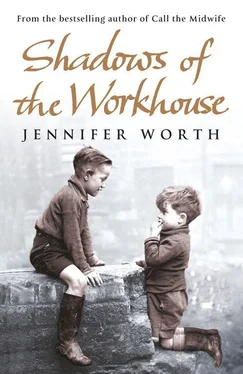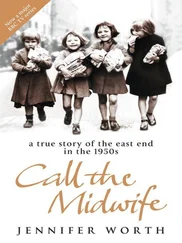Jennifer Worth - Shadows Of The Workhouse - The Drama Of Life In Postwar London
Здесь есть возможность читать онлайн «Jennifer Worth - Shadows Of The Workhouse - The Drama Of Life In Postwar London» весь текст электронной книги совершенно бесплатно (целиком полную версию без сокращений). В некоторых случаях можно слушать аудио, скачать через торрент в формате fb2 и присутствует краткое содержание. Жанр: Биографии и Мемуары, на английском языке. Описание произведения, (предисловие) а так же отзывы посетителей доступны на портале библиотеки ЛибКат.
- Название:Shadows Of The Workhouse: The Drama Of Life In Postwar London
- Автор:
- Жанр:
- Год:неизвестен
- ISBN:нет данных
- Рейтинг книги:5 / 5. Голосов: 1
-
Избранное:Добавить в избранное
- Отзывы:
-
Ваша оценка:
- 100
- 1
- 2
- 3
- 4
- 5
Shadows Of The Workhouse: The Drama Of Life In Postwar London: краткое содержание, описание и аннотация
Предлагаем к чтению аннотацию, описание, краткое содержание или предисловие (зависит от того, что написал сам автор книги «Shadows Of The Workhouse: The Drama Of Life In Postwar London»). Если вы не нашли необходимую информацию о книге — напишите в комментариях, мы постараемся отыскать её.
Shadows Of The Workhouse: The Drama Of Life In Postwar London — читать онлайн бесплатно полную книгу (весь текст) целиком
Ниже представлен текст книги, разбитый по страницам. Система сохранения места последней прочитанной страницы, позволяет с удобством читать онлайн бесплатно книгу «Shadows Of The Workhouse: The Drama Of Life In Postwar London», без необходимости каждый раз заново искать на чём Вы остановились. Поставьте закладку, и сможете в любой момент перейти на страницу, на которой закончили чтение.
Интервал:
Закладка:
“Didn’t their mother feel left out?”
“You’re right there, she did. The boys weren’t lacking in affection, or anything like that. They were just totally self-sufficient. In fact, Sally once said, ‘I reckon you and me could die, Joe, and they wouldn’t notice. But if one of the boys died, I reckon the other would just fade away.’”
Tears glistened in the corners of his eyes, and he murmured, “Perhaps it was best, all for the best. The Lord giveth, and the Lord taketh away.” He fell completely silent, lost in thought.
I had heard of two sons being killed in France, and looked at the picture of two handsome little boys on the wall. I asked, “Did you have any more children?”
“Yes, we had a little girl, and Sally nearly died in childbirth. I don’t know what went wrong, and the midwife didn’t know either, but my Sal was near to death for weeks after the birth. Her sister took the baby and wet-nursed her for the first three months, and the boys went to my mother. It frightened the life out of me, so I never let her go through it again. That’s one thing you learn about in the army, if nothing else: contraception. I never could understand these men who let their wives have ten or fifteen children, when they could prevent it.
“But Sally recovered, thank God, and the children came home. We called the little girl Shirley – don’t you think that’s a pretty name? She was the loveliest little thing in all the world and a blessing to us both.”
I did not need to see Mr Collet professionally more than once a week, because his legs were nearly better, but our sherry evenings continued, and during one of them he told me the story of Pete and Jack.
Young girls are not usually interested in war and military tactics, but I was. Wartime had shaped my childhood, but really, I knew little about war itself. The First World War was a mystery to me, and we were taught nothing about it in our history lessons at school. I knew that vast numbers of soldiers had died in the trenches of France, but so great was my ignorance that I did not even know what “trenches” meant. Later I met people who had suffered in the Blitz, and heard their first-hand stories, so when Mr Collett mentioned his sons’ experiences I encouraged him to talk.
Pete and Jack had been sixteen years old when the war started. They had left school at the age of fourteen, and for two years had been Post Office telegraph boys, racing around London on their bikes delivering telegrams. They were known as “the flying twins”. They loved it, were proud of their work, proud of the uniform, and were both healthy from all the fresh air and exercise. But in 1914 war started, and a national recruitment campaign was launched. “It will all be over by Christmas” was the government’s promise. Many of their friends joined up, lured by the thought of adventure, and the twins wanted to go too, but their father restrained the boys, saying that war was not all adventure and glory.
1915 saw the launch of the famous poster of Lord Kitchener, pointing darkly out of the frame and saying “Your country needs you”. After that, young men who did not join up were made to feel that they were cowards. Hundreds of thousands of young men volunteered, Pete and Jack among them, and marched off to their graves.
The men were sent for three months’ military training in how to handle a gun and a grenade. Also how to care for horses and sword fighting for hand-to-hand combat were part of their training. Mr Collett commented wryly: “That just shows you how little the military High Command knew about mechanised warfare with high explosives!”
Men, boys and horses were packed into a steamer that stank of human sweat and horse droppings, and were shipped across the Channel to France. They were sent straight to the front-line trenches.
I said, “I’ve heard about this, front lines and trenches and going over the top and the likes, but what does it all mean?”
He said, “Well I wasn’t there – I was too old. I suppose I could have gone as a veteran, but the Post Office was vital work, because all communications were handled by the Post Office, so I don’t think I would have been released. However, I have met several men who were there at the front and who survived, and they told me the realities we never heard about back home.’
“Tell me about them, will you?”
“If you really want me to I will. But are you sure you want to hear? It’s not the sort of thing one should discuss with a young lady.”
I assured him I really did want to hear.
“Then you had better get me another drink. No, not that sherry stuff. If you look in the bottom of that cupboard you will find half a bottle of brandy.”
I filled his glass, and he took a gulp.
“That’s better. It upsets me, talking about it. My two beautiful boys died in those trenches. I reckon I need a bit of brandy inside just to think about it.”
He finished the glass, and handed it back to me for a refill, then continued his narrative.
The things he told me that evening were deeply disturbing. The trenches, I learned, were a series of massive dugouts intended as temporary camouflage in flat countryside that offered no natural protection for an army. In the event, they were used for four years of continuous warfare, and provided living accommodation for soldiers.
For months on end men were camped underground in trenches that were always damp, and sometimes waterlogged. Conditions were so cramped, and the men so tightly packed side by side, that the only way to sleep was to stand with their heads and shoulders learning over the parapet. Trench-foot (rotting of the skin caused by a fungal infection), frost-bite and gangrene were rife. The men endured filthy clothes, unchanged for weeks, and lice, millions of lice, that spread from one man to another and were impossible to eliminate. There was no sanitation, and drinking water was contaminated by mud and sewage. Hot food was an infrequent luxury. The rats were everywhere, thriving on an unlimited supply of human flesh as men died in such numbers that the living were unable to bury them.
Both armies were entrenched in their dugouts, often in a line only a hundred yards apart, and both sides were ordered to blow the other to smithereens. Men were being blown to pieces all around; arms, legs, heads were blown off; men were disembowelled, faces torn open, eyes shot out. If the men were ordered to leave their trenches (“go over the top” as it was called) and advance on foot towards the enemy line they would be heading straight into the line of fire and as many as 100,000 men could die in a single day.
And all the time, the cold, the damp, the hunger, the lice, and the stench of decomposition as rats gnawed at the corpses of the dead, drove the men stark raving mad.
“It’s worse than I had thought, far worse,” I said. “I can’t even imagine it. I think I would have gone out of my mind in such a situation.”
“Many did. And there was precious little sympathy for them.”
“It is surprising that men did not simply run away. What was to stop them?”
“Desertion was punishable by death by firing squad.”
In that instant I remembered my Uncle Maurice. He was a strange, withdrawn man subject to violent passions and irrational behaviour. He was potentially dangerous, and I had always been very afraid of him. My aunt told me that he had spent four years, the entire war, in the trenches and somehow miraculously survived. “Don’t provoke him dear,” she would say, and I could see that her entire life was devoted to trying to ease his mind and bring tranquillity to his life. She was an angel, and I thought at the time that he did not deserve her – but without her he would have been a nervous wreck, and probably even certified as insane.
Читать дальшеИнтервал:
Закладка:
Похожие книги на «Shadows Of The Workhouse: The Drama Of Life In Postwar London»
Представляем Вашему вниманию похожие книги на «Shadows Of The Workhouse: The Drama Of Life In Postwar London» списком для выбора. Мы отобрали схожую по названию и смыслу литературу в надежде предоставить читателям больше вариантов отыскать новые, интересные, ещё непрочитанные произведения.
Обсуждение, отзывы о книге «Shadows Of The Workhouse: The Drama Of Life In Postwar London» и просто собственные мнения читателей. Оставьте ваши комментарии, напишите, что Вы думаете о произведении, его смысле или главных героях. Укажите что конкретно понравилось, а что нет, и почему Вы так считаете.






![Theresa Cheung - The Dream Dictionary from A to Z [Revised edition] - The Ultimate A–Z to Interpret the Secrets of Your Dreams](/books/692092/theresa-cheung-the-dream-dictionary-from-a-to-z-r-thumb.webp)





